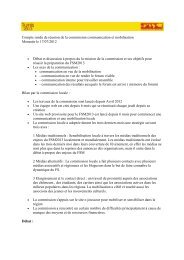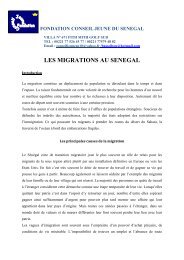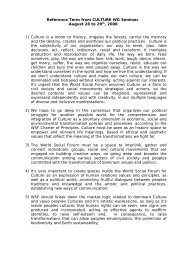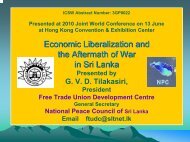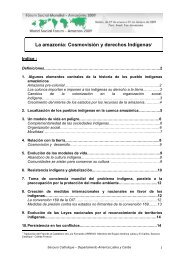Create successful ePaper yourself
Turn your PDF publications into a flip-book with our unique Google optimized e-Paper software.
<strong>Press</strong> <strong>Report</strong> <strong>Europe</strong> <strong>WSF</strong> <strong>2009</strong><br />
mafia are always more interconnected; they have no borders, and coordinated, global action is needed to fight<br />
them."<br />
Libera is involved in many anti-mafia activities, such as acquisition of farms and buildings confiscated from<br />
groups allied to mafia. These are then transformed and used for social purposes, such as schools and drug<br />
rehabilitation centres.<br />
"Mafia actions have a trans-national dimension, and the Italian mafia can now count on alliances in diverse<br />
sectors," says Tonio dell'Olio, head of the international section of Libera.<br />
Human trafficking, trade in narcotics and arms, eco-mafias, labour exploitation and money laundering can be<br />
successfully contrasted only by a "global social network committed to fight illegal acts."<br />
Libera will organise a workshop in Belem to promote a Latin American civil society network against the mafia.<br />
"Starting from the <strong>WSF</strong>, we will work to build a network with Latin American associations which can link the<br />
idea of social justice and respect for law with economic and social development," Dell'Olio told IPS.<br />
Libera wants to share its experience and expertise in handling political pressure with other organisations at the<br />
<strong>WSF</strong>, he said. It will present a <strong>Europe</strong>an law as a model for social use of confiscated goods and for<br />
strengthening investigative and judicial cooperation among <strong>Europe</strong>an member states.<br />
Narco-traffic in drugs such as heroin, cocaine, cannabis and marijuana is the biggest source of income for mafia<br />
groups.<br />
The 2007 World Drug <strong>Report</strong> released by the United Nations Office on Drugs and Crime (UNODC) says this<br />
criminal market feeds more than 230 million drugs consumers around the world. <strong>Europe</strong> is the second biggest<br />
global market for drugs after North America, with an estimated wholesale value of 1.8 billion dollars. The<br />
biggest markets in <strong>Europe</strong> are Spain, Italy and Britain.<br />
In Italy consumption of heroin, cocaine and synthetic drugs has risen rapidly over the last 30 years, and the<br />
police department now talks of "mass consumption" of these substances.<br />
The traffic is in the hands of powerful and well-structured criminal organisations that not only have capital and<br />
people working within the territory, but also alliances with criminal groups abroad such as the Colombian<br />
cartels, Libera reports.<br />
According to Dell'Olio, the profits and power of Italian criminal organisations widely known as Naples' Camorra,<br />
Calabrian 'Ndrangheta and the notorious Cosa Nostra of Sicily have grown enormously since they got access to<br />
international narco-traffic.<br />
Narco-traffic appears to have been strengthened by unfair policies and the general lack of social justice and<br />
measures to tackle poverty. "These are often inadequate; they miss realism, and so are destined to fail," says<br />
Libera president Father Luigi Ciotti.<br />
Ciotti set up the Gruppo Abele (Abel's Group) 30 years ago to help drug victims in juvenile detention centres.<br />
But the root of the problem, quite literally, lies elsewhere.<br />
"If you look at the conversion of crops in countries producing cocaine, you'll see that one hectare of coca<br />
returns 10 to 15 times more than one hectare of coffee cultivated land," says Ciotti.<br />
The real dimension of the problem has been underestimated, he says. "The first step to fight criminal<br />
organisations effectively is to give an accurate and transparent picture of their business volumes, making clear<br />
their real dimension and all the possible interconnections and implications."<br />
Lack of transparency feeds the mafia, Ciotti said, "that's why we do need truth."<br />
Between 1997 and 2006, 7,923 people, mostly male youths, died in Italy from consumption of illicit drugs.<br />
Libera says they are all victims of the mafia. (END/<strong>2009</strong>)<br />
13




